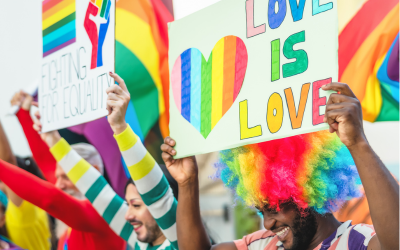Here is an excerpt of a piece written by an OUT Maine Intern, Lexi about Stonewall & The Origin of Pride…

Pride Month, which today often brings to mind large celebratory parades and festivals, was actually born out of a nearly week-long public uprising in New York City in 1969. This uprising is remembered today as the Stonewall Uprising or the Stonewall Riots.
Stonewall is often hailed as the beginning of the LGBTQIA+ rights movement in the United States; however, while Stonewall was the spark that at last ignited public and mainstream recognition of the movement, efforts to protect and improve the lives of queer people were not new. In the 1920s, activist Henry Gerber formed The Society of Human Rights, which is considered today to be the first LGBTQIA+ rights organization in the United States. Established in Chicago in 1924, The Society of Human Rights was small and short-lived; just months after the group’s formation, Gerber, along with additional members of the organization, were arrested under supposed “obscenity” charges. These arrests led to the disbandment of the organization after the legal fees bankrupted The Society and the charges cost Gerber his postal worker job. Despite the societal prejudices that worked against The Society of Human Rights’s efforts and eventually led to its disbandment, Henry Gerber and The Society’s other members are remembered today as some of the earliest pilots of the queer rights movement through their establishment of the organization and its printing of “Friendship and Freedom,” which was the first American publication for homosexuals. Furthermore, Gerber’s bravery has provided a lasting impact through its inspirational impact on other queer Americans; following the disbandment of The Society of Human Rights, the 1950s and 1960s in the United States saw the birth of “homophile groups” across the country. These groups, including Daughters of Bilitis and Mattachine, bravely established chapters of their organizations in major American cities, which led public demonstrations and televised appearances where group members shared their homosexual identities openly in the face of numerous threats, including imprisonment, employment termination, and family rejection.
Following in the footsteps of these original LGBTQIA+ rights organizations, today’s LGBTQIA+ movement often has its origins attributed to the Stonewall Uprisings of 1969. At this time, queer individuals were still persecuted for being publicly out, and as such, many LGBTQIA+ people found a strong sense of community in gay bars and clubs, where they did not have to hide their identities and could connect with other queer people in a social setting. However, these gatherings were still persecuted in a number of ways, including laws that forbade businesses from serving alcohol to anyone who was or was suspected to be LGBTQIA+. These laws allowed for the forcible shut down of businesses that violated its terms on the pretense that merely supporting the gathering of LGBTQIA+ people was fostering “disorderly” conduct. While liquor laws like this were eventually overturned in New York in 1966 after continuous efforts by LGBTQIA+ activists, bars offering social refuge to queer communities were still frequently targeted and raided by police.
